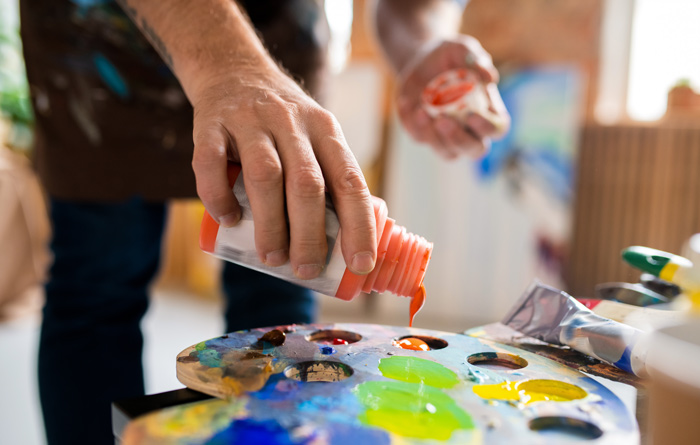Many people—including many artists—believe that using drugs or alcohol enhances their creativity. Certainly, there are plenty of legendary examples of artists of various kinds using drugs or alcohol (or both) to excess, and often that substance use gets romanticized as an essential part of a given artist’s process that leads to brilliant creative expression.
But the reality is much, much different.
Using drugs and alcohol to excess does not, in fact, enhance one’s creativity. Instead, the development of a substance use disorder is likely to stunt one’s creative output and can, of course, put whole careers—and lives—at risk.
It turns out, however, that while substance use does not enhance creativity, creativity does enhance recovery efforts. And you don’t have to be a world class artist to experience the benefits.
Potential Benefits of Getting Creative
In one sense, the benefits of doing creative work—whether it is writing or painting or working with clay or acting or any of many other options—are simple to understand. Any and all of these activities can keep you busy, staving off boredom and keeping your mind off of drugs and alcohol.
And if you choose a creative activity that involves collaboration with others, like participating in community theater or taking a dance class, you will keep loneliness at bay as well. This, too, can be important to maintaining long-term sobriety.
But creative work can also have a more direct effect on your recovery efforts. For example, if past traumatic experiences have played a role in your substance use disorder, it is possible that writing, painting, or acting/role play—particularly under the direction of a therapist who specializes in art therapy—can help address that trauma in helpful ways even before you’re ready to face it head on.
Another benefit of artistic endeavor is that it can help reduce stress and improve mood. For example, one study suggested that participating in music-making as a member of a band or choir could help lessen negative emotions. The mood boost that comes with creative expression can help reduce cravings, making relapse less likely.
And there are a range of additional potential benefits as well, including more flexibility, playfulness, and mastery in other pursuits (including in the workplace) after engaging in creative activity. For a person in recovery, the cumulative benefits of getting involved in something that requires creativity are simply too many to be ignored.
Getting Those Creative Juices Flowing
Now, you may be thinking to yourself, “That’s all well and good, but I don’t have a creative bone in my body.” We beg to differ.
The wonderful thing about creativity is that it is so personal—and it doesn’t require that you become a master of an art form. Learn three chords on guitar and you can suddenly sing a lot of songs (and who cares if you are a little—or a lot—off key?). Pick up a pen (or sit down at your computer keyboard) and write whatever comes to mind—memories, your observations about a cloud floating by, your hopes for your life. Over time, you may start crafting stories or poems or songs or a journal that records the important moments in your life. Doodle or paint without worrying too much about the result as you first get started.
The important thing is to find something you enjoy and to do it for yourself. And if it turns out you have a knack for something and eventually want to share your art with an audience, so much the better!
We Want to Create a Relationship with You
At The Aviary Recovery Center, we understand that each individual is a unique and beautiful piece of art. We’ll put together a personalized treatment plan designed just for you. We have the compassion, the expertise, and, yes, the creative thinking skills necessary to make sure your rehabilitation experience sets you on the right path. And we’ll make sure you have all the tools and resources you need to ensure lasting—and creatively rich—sobriety.
(314) 464-0222. We’re here to help.
www.psychologytoday.com/us/blog/where-science-meets-the-steps/201710/7-ways-creativity-supports-addiction-recovery










